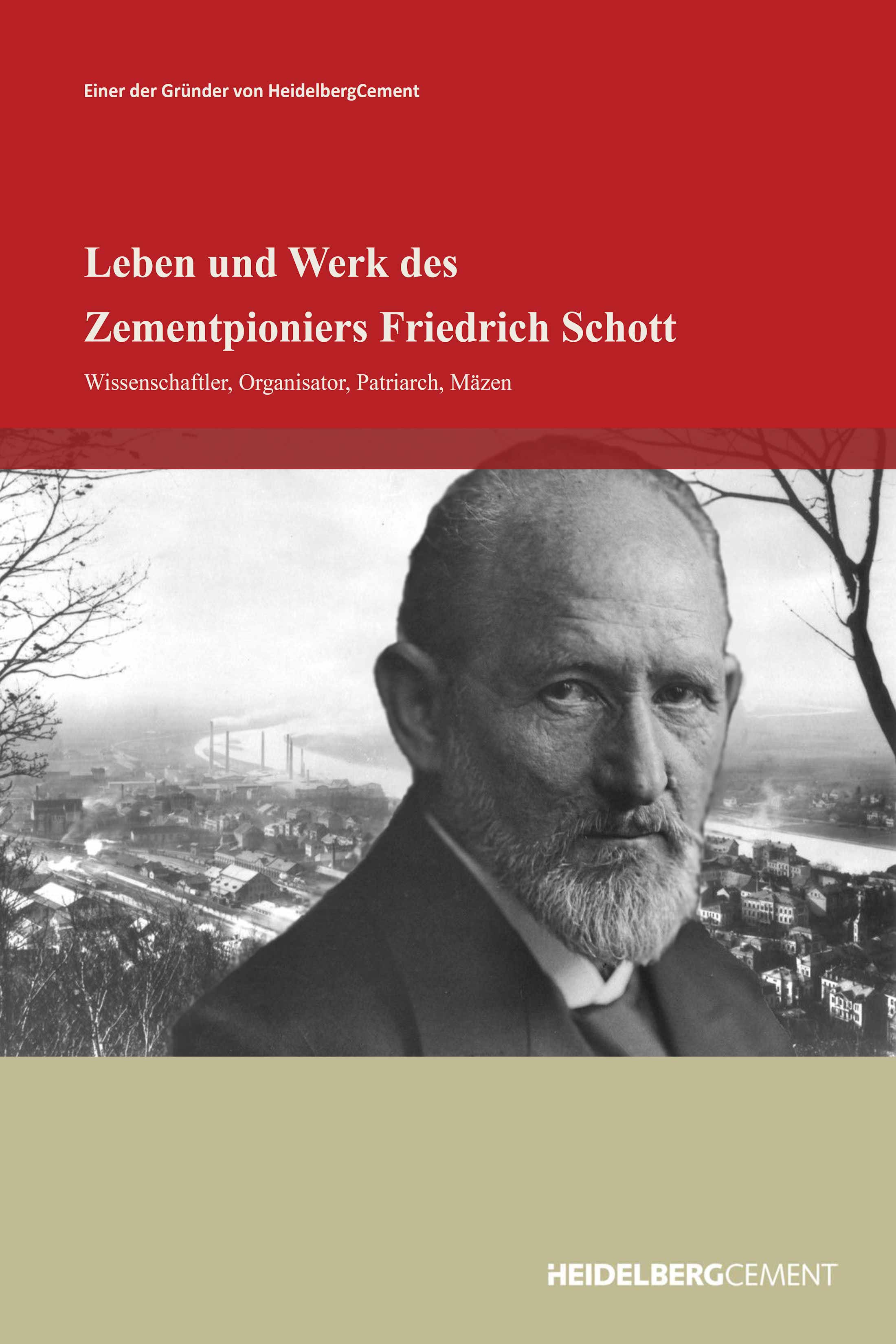Group picture of miners in the Leimen quarry for the Barbara celebration, in the centre Friedrich Schott with his wife Emma, 1895.
Friedrich Schott with his family in front of his parents' house in Seesen, 22 May 1876
Friedrich Schott with secretary in the management office in Leimen, 1900
Life and work of the cement pioneer Friedrich Schott
Time of the pioneers
The building materials industry was always a close companion of industrialisation in the 19th and 20th centuries. With the invention of a new type of cement in 1824 by the English mason Joseph Aspdin (*1778, †1855), the so-called Portland cement, a new binding agent had come onto the market. Portland cement was superior to the then common Roman cement in terms of workability and strength development. Nevertheless, the cement was still far from being fully developed. On the European mainland, every effort was therefore made to produce a product comparable to the English cement. It took half a century until the knowledge about the required material was available and the chemistry of the setting processes was essentially understood. The young cement industry made special demands on science, technical ability, but also on commercial skills. Friedrich Schott brought some of these qualities with him.
Jewish-Protestant parental home
He was born on 27 December 1850 in Gandersheim, the son of Emil August Schott and Louise Dernedde. He was influenced by his father, a researcher and well-read as well as liberal-minded person. On the other hand, by his mother, from a peasant background, who taught him hard-working and strict Protestant discipline. She often had to lead the large family through existential crises. Friedrich Schott was one of the leading personalities in the young Portland cement industry. He worked as an entrepreneur, researcher and politician from the founding of the German Empire to the end of the Weimar Republic.
His ethical, moral and political views have their roots in his parental home. Jewish traditions were familiar to him through his grandfather Benedikt and his father Emil, even though they both later converted to Protestantism. From this side he experienced in particular education, a thirst for research, life according to set rules and striving for unity, but also generosity and a sense of family. Professionally, he was guided by his father Emil, who taught him basic chemical knowledge and interested him in cement production through his experiments. Through the Protestant virtues of his mother Louise, perseverance, frugality and a practical orientation were fostered in him. At a young age, he had to live with relatives for several years during his primary school years, together with his younger brother Hermann. Friedrich received much praise from his mother as a bright and eldest son and was pushed by her into responsibility for his siblings at an early age. As a result, as the eldest son, he often had to take on the role of father and a leadership position, as his father Emil was often away from home for long periods of time. On top of that, Emil was portrayed by Louise as amiable, but increasingly as unworldly and not fit for life. The father's lack of economic success connects Friedrich more closely with the mother and her virtues.
Scientist, engineer, and patriarch
After his employment at the Portland-Cement-Werk Heidelberg, Schifferdecker & Söhne in 1875, he became the family's benefactor and took care of his brothers' education. Due to his good education, his self-confidence and his own research, he succeeded in getting a job at Johann Philipp Schifferdecker and mastered the problems that arose. His father's optimism about progress was also transferred to him. He, too, relied on new technologies and made major investments, but calculated the economic benefits sharply. His ideas and research were always scientifically and technically up to date and fundamentally oriented, so that they remained valid for a long time. He saw the fulfilment of duty as a task that each class had to do for itself, but which encompassed the authorities, entrepreneurs and workers as a unifying bond. Instead of demanding law and justice, the worker should practise obedience and diligence and thus be the architect of his own fortune. This brought him into sharp opposition to the trade unions and the Social Democratic Party. Friedrich Schott created well thought-out welfare institutions at all sites, as well as support funds and bonus systems, in order to bind the workers to the company and keep them dependent.
Organiser
In addition to his scientific and technical skills, his negotiating skills were essential to Schott's success. It was virtually a mission for him to unify the national cement industry in order to avoid competition at all costs. The well-established Heidelberg cement works emerged stronger from the unification in the cement associations. By placing his brothers and his sons in leading positions, he had loyal and like-minded support for years. The drastic changes brought about by the First World War once again challenged Friedrich Schott's fighting spirit. However, he struggled with the innovations of the Weimar era, found it difficult to retire from office and found fault with the new style of leadership on the board at the end of the 1920s.
- Heidelberg’s Portland cement-makers: articles on the company’s history and corporate culture, issue 13
-
Life and Work of the cement pioneer Friedrich Schott
Scientist, Organiser, Patriarch, Patron[published by HeidelbergCement AG]
Karola Birkle - MannheimCopyright © 2021 Karola Birkle/HeidelbergCement AG
Berliner Straße 6, 69120 HeidelbergCover photo: Friedrich Schott, 1930.
Layout/Design and Realisation: Unternehmensarchiv Heidelberg Materials
Translation: Kurt Armstrong - Sydney




